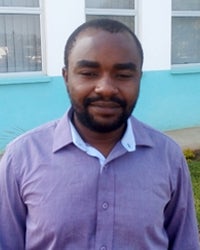
- This event has passed.
Dissertation Proposal - Michael Chiwere
March 6, 2023 @ 10:00 am MST
Event Navigation
 New developments in barycentric interpolation: spectrally accurate formulas for polar and spherical geometries with applications to semi-Lagrangian methods and data-driven formulas for rational interpolation
New developments in barycentric interpolation: spectrally accurate formulas for polar and spherical geometries with applications to semi-Lagrangian methods and data-driven formulas for rational interpolation
Presented by Michael Chiwere – Computational Math Science and Engineering emphasis
In-person – Mathematics Building, Room 126
Abstract
Constructing high-order accurate interpolation formulas for gridded data is an essential task in many areas of computational science. This dissertation proposal consists of three projects related to the development and application of barycentric interpolation formulas, which are particularly well-suited for interpolation on gridded data because of their simple form and excellent stability properties. In the first project, we will derive new spectrally accurate barycentric interpolation formulas for tensor product grids in spherical and polar geometries. These grids are commonly used in weather/climate forecasting, optics, and astrophysics. However, they present issues for interpolation and approximation techniques because of artificial boundaries that are introduced by spherical and polar coordinates. The barycentric formulas we propose eliminate these issues by using the Double Fourier sphere (DFS) method, which transforms a sphere into a doubly periodic domain and a disk into a domain without an artificial boundary. We will show how to exploit symmetries associated with the DFS methods to derive bivariate trigonometric interpolation formulas for the sphere and bivariate trigonometric/polynomial barycentric interpolation formulas for disks that are exponentially accurate for approximating smooth functions. We will also show how the formulas can be accelerated through the Nonuniform Fast Fourier Transform (NUFFT) without compromising accuracy.
In the second project, we propose to use the interpolation formulas for the sphere in Project 1 to develop a semi-implicit semi-Lagrangian (SSL) method for solving the shallow-water wave equations (SWE) on the sphere. These equations arise in numerical weather/climate prediction and SSL methods are popular for solving them as they allow the use of larger time-steps than Eulerian based methods. We will use a recently developed SSL method that employs tensor product spherical grids and spectrally accurate approximations for all steps except the interpolation step that arises in the advection solvers. We propose to replace this step with the interpolation formulas from Project 1. The result will be the first truly spectrally accurate SSL for SWE. We will compare the performance of this method to others using standard test cases from the literature.
In Projects 1 and 2, we use the standard way of choosing barycentric weights, which, for a given set of n distinct points over an interval, produces an exact interpolation formula for all polynomials up to degree n-1. This restriction can result in numerically unstable interpolation formulas for some sets of points or formulas that may not be accurate for reconstructing certain types of functions. One way to improve stability and accuracy properties is to choose weights using another technique, which produces a rational approximant. In the third and final project, we propose to develop data-driven techniques for choosing barycentric weights based on deep neural networks (DNNs). We will explore different architectures for the network and different types of data to train the network to achieve results that are consistently better than other techniques for choosing barycentric weights. This will be the first application of DNNs to rational approximation problems.
Committee
Dr. Grady Wright (Chair), Dr. Jodi Mead, and Dr. Donna Calhoun